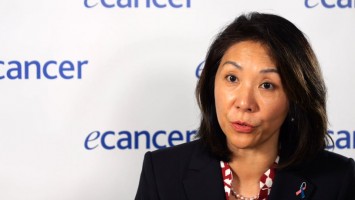My clinical practice is primarily lymphomas and my area of research is clinical investigations in the immunotherapies of lymphoma. At this meeting we’ll be presenting the results of a large multi-centre trial that is a novel immunotherapeutic approach for treatment of B-cell large cell lymphoma. That is a treatment that is actually novel both in terms of its mechanism of action – it’s not cross-resistant to patients that are resistant to chemotherapy or monoclonal antibody therapy; it’s also unique in its toxicities – these are not the same toxicities that people see with standard oncology treatments or immuno-chemotherapy. So it’s a new approach to treatment of these patients for whom our conventional approaches have failed.
This genetically engineered T-cell is engineered to express a chimeric antigen receptor. That is a receptor which is capable of recognising an antigen called CD19 on the surface of the malignant B-cell as well as normal B-cells and kills the cell the way that the T-cell would normally kill a virally infected cell. T-cells are part of the immune system which protect us against viral infections, so in much the same way these cells can be redirected to kill tumour cells. Initially the studies were done in children and young adults with B-cell ALL which express CD19 and the results were phenomenal – 80% complete response rates, 75% durable beyond a year. Very good response rates and then a few patients with CLL had impressive responses so we started a study at the University of Pennsylvania in large B-cell and follicular lymphoma and the results of that pilot study have been published today in The New England Journal of Medicine. We’ve very, very good results – 71% durable complete remissions in refractory follicular lymphoma patients and 43% complete remission in diffuse large B-cell lymphoma patients that were relapsed and refractory to conventional therapies.
So the JULIET trial, which we will be presenting at this meeting, is based on the large cell arm of the pilot study that we did at the University of Penn. and there we formed a global study under the sponsorship of Novartis who licensed the technology from Penn. The cells were made at Novartis facilities in New Jersey and in Germany and we treated patients at 27 different centres in ten countries on four continents. So we were able to export this technology around the world and got very, very similar results. So this is a big breakthrough therapy and, in fact, a similar product has been recently approved by the FDA within the last couple of weeks in the US and our product data have been submitted to the regulatory agencies in the EU and in the US and I anticipate that this will become something that is available off or outside the setting of a clinical trial in many, many countries in the early part of 2018. So we will be able to save more lives than we could prior to the introduction of this new therapeutic approach.
To recap, there’s now a treatment for those patients with diffuse large B-cell lymphoma that have failed to respond to or recurred after conventional therapies for whom up until this point in time we’ve had no definitive treatments that generally have an estimated median survival of about four months. Those patients now have a therapy that about a third of the time can lead to a durable remission lasting for years following a single treatment with chimeric antigen receptor modified T-cells. Toxicities are manageable – we’ve seen no deaths directly related to the chimeric antigen receptor T-cell that we’ve used which is called tisagenlecleucel or Kymriah is the trade name in the US.
The unique toxicities are cytokine release syndrome which is much akin to the symptoms that patients get when they get a severe infection - fever, low blood pressure etc., and then neurotoxicity – confusion, delirium etc. Both toxicities are reversible and we can use interleukin-6 blocking agents to stop the CRS if a patient becomes seriously ill with it. We had no deaths related to that in my study or in the global study, JULIET. Similarly the neurologic symptoms tend to reverse on their own although sometimes we give patients dexamethasone.








